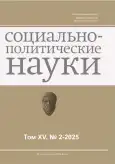Конфликт Россия–Запад через призму стратегической культуры
- Авторы: Полулях Д.С.1
-
Учреждения:
- Московский государственный университет имени М.В. Ломоносова
- Выпуск: Том 15, № 2 (2025)
- Страницы: 89-100
- Раздел: Международные отношения, глобальные и региональные исследования
- URL: https://journal-vniispk.ru/2223-0092/article/view/296084
- DOI: https://doi.org/10.33693/2223-0092-2025-15-2-89-100
- EDN: https://elibrary.ru/PCNVJZ
- ID: 296084
Цитировать
Аннотация
Цель исследования – предложить объяснение конфликта России и Запада через феномен стратегической культуры. В статье выделяется два противоположных типа стратегической культуры – реалистская и либеральная. В обществах, в которых население и элиты ощущают внутреннюю или внешнюю угрозу своему существованию, распространяется реалистская стратегическая культура. В отсутствии таких угроз развивается либеральная стратегическая культура. Взаимодействие стран, являющихся носителями противоположных стратегических культур, чревато возникновением таких проблем как тупики в диалогах вследствие несовместимости базовых ценностных установок, непонимание и искаженное раскодирование сигналов, поступающих от контрагента. Российская стратегическая культура является преимущественно реалистской, в то время как стратегическая культура Запада – в значительной степени либеральная, хотя и содержит элементы реализма. Результаты исследования показывают, что реалистская стратегическая культура России вступает в противоречие с либеральной стратегической культурой западных стран, результатом чего становится расхождение позиций сторон по таким вопросам как предпочтительная структура международной системы, интерпретация «цветных революций», политика «открытых дверей» НАТО, а также возникновение эффекта искаженного раскодирования при обсуждении проблем сферы влияния и внутриполитической ситуации в России, а также расширения НАТО на восток. Предполагается, что полное решение проблемы противоречия внешнеполитических ценностей и представлений возможно только при изменении стратегической культуры одной или обеих сторон, что требует трансформации социально-экономических и геополитических условий.
Ключевые слова
Полный текст
Открыть статью на сайте журналаОб авторах
Даниил Сергеевич Полулях
Московский государственный университет имени М.В. Ломоносова
Автор, ответственный за переписку.
Email: daniilpolulyakh@mail.ru
ORCID iD: 0000-0001-5939-3062
SPIN-код: 6903-4177
ResearcherId: B-9088-2017
кандидат политических наук, ассистент, кафедра сравнительной политологии, факультет политологии
Россия, МоскваСписок литературы
- Белозёров В.К. Методы анализа стратегических культур // Контуры глобальных трансформаций: политика, экономика, право. 2022. Т. 15. № 5. С. 29–49.
- Алексеева Т.А. Стратегическая культура: эволюция концепции // Полис. Политические исследования. 2012. № 5. С. 130–147.
- Norris P., Inglehart R. Cultural backlash: Trump, Brexit, and the rise of authoritarian-populism. New York: Cambridge University Press, 2018. 540 p.
- Зевелёв И.А., Троицкий М.А. Сила и влияние в американо-российских отношениях: семиотический анализ. Очерки текущей политики. Вып. 2. М.: Науч.-образ. форум по междунар. отношениям, 2006. 72 с.
- Mearsheimer J. The tragedy of great power politics. New York: Norton, 2001. 555 p.
- Waltz K.N. Realism after the Cold War // International Security. 2000. Vol. 25. No. 1. Pp. 5–41.
- Wohlforth W.C., Zubok V.M. An abiding antagonism: Realism, idealism and the mirage of Western–Russian partnership after the Cold War // International Politics. 2017. Vol. 54. Pp. 405–419. URL: https://link.springer.com/article/10.1057/s41311-017-0046-8 (дата обращения: 05.02.2025).
- Андреенкова Н.В. Ценностные цели социализации в социокультурном пространстве России и Европы // Социология и общество: традиции и инновации в социальном развитии регионов: сб. докл. VI Всероссийского социологического конгресса (Тюмень, 14–16 октября 2020 г.) / отв. ред. В.А. Мансуров; ред. Е.Ю. Иванова. М.: РОС; ФНИСЦ РАН, 2020. С. 1470–1476.
Дополнительные файлы









